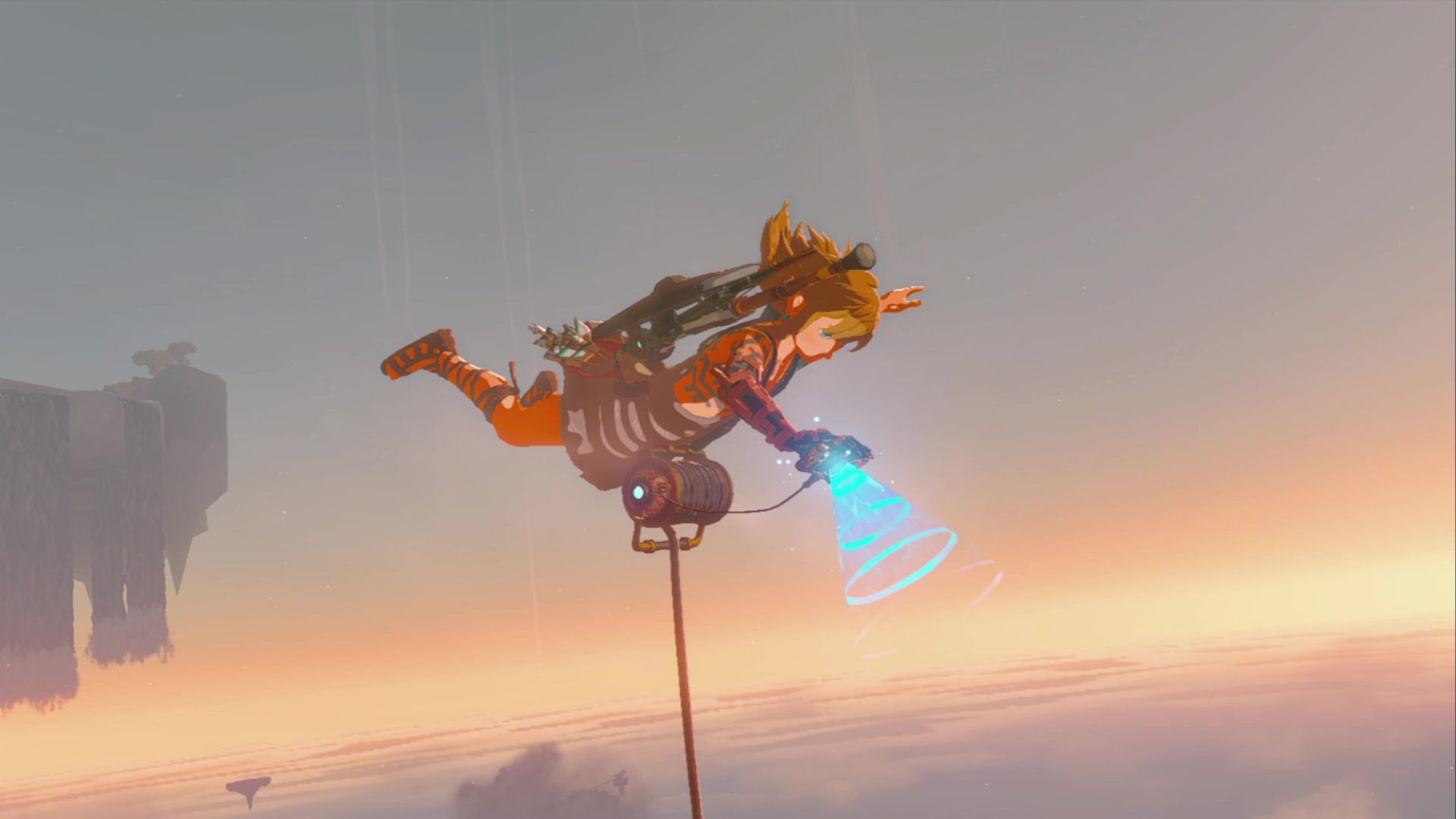GamesRadar+ Verdict
Tears of the Kingdom builds on what Breath of the Wild did previously – and with a platform like that to work on, the result can't help but be fantastic. Though with the occasional hiccup in execution, the end result is a game as broad as it is deep, and something that comfortably justifies the six-year wait.
Pros
- +
New powers and systems open whole realms of gameplay
- +
An evocative, intriguing storybook narrative
- +
Makes Hyrule feel fresh again
Cons
- -
The occasional fumble in presentation and UI
- -
The Depths are a bit of a drag
- -
Couple of irritating boss fights
Why you can trust GamesRadar+
The Legend of Zelda: Tears of the Kingdom was worth the six year wait. I knew it by the second hour – a slow, steady relief washed over me; the realisation that the nail-biting saga of gaming's most awaited sequel in years was going to have a happy ending for all us players after all. It was a relief soon followed by the simple, giddy thrill of knowing I had a really big, really good game to enjoy in the weeks to follow.
Release date: May 12, 2023
Platform(s): Nintendo Switch
Developer: In-house
Publisher: Nintendo
Tears of the Kingdom is a game where you can build a makeshift mechanical cannon-equipped glider, fly it into the back of a three-headed ice dragon, then meld your sword with that dragon's own exhaled projectiles and effectively beat it with its own breath. Then scoop up the loot, leap into the nearest tower, and fire yourself into a low orbit to choose where you want to swoop down for your next adventure.
So... Yep. It's definitely worth the wait.
There's something in the basement!
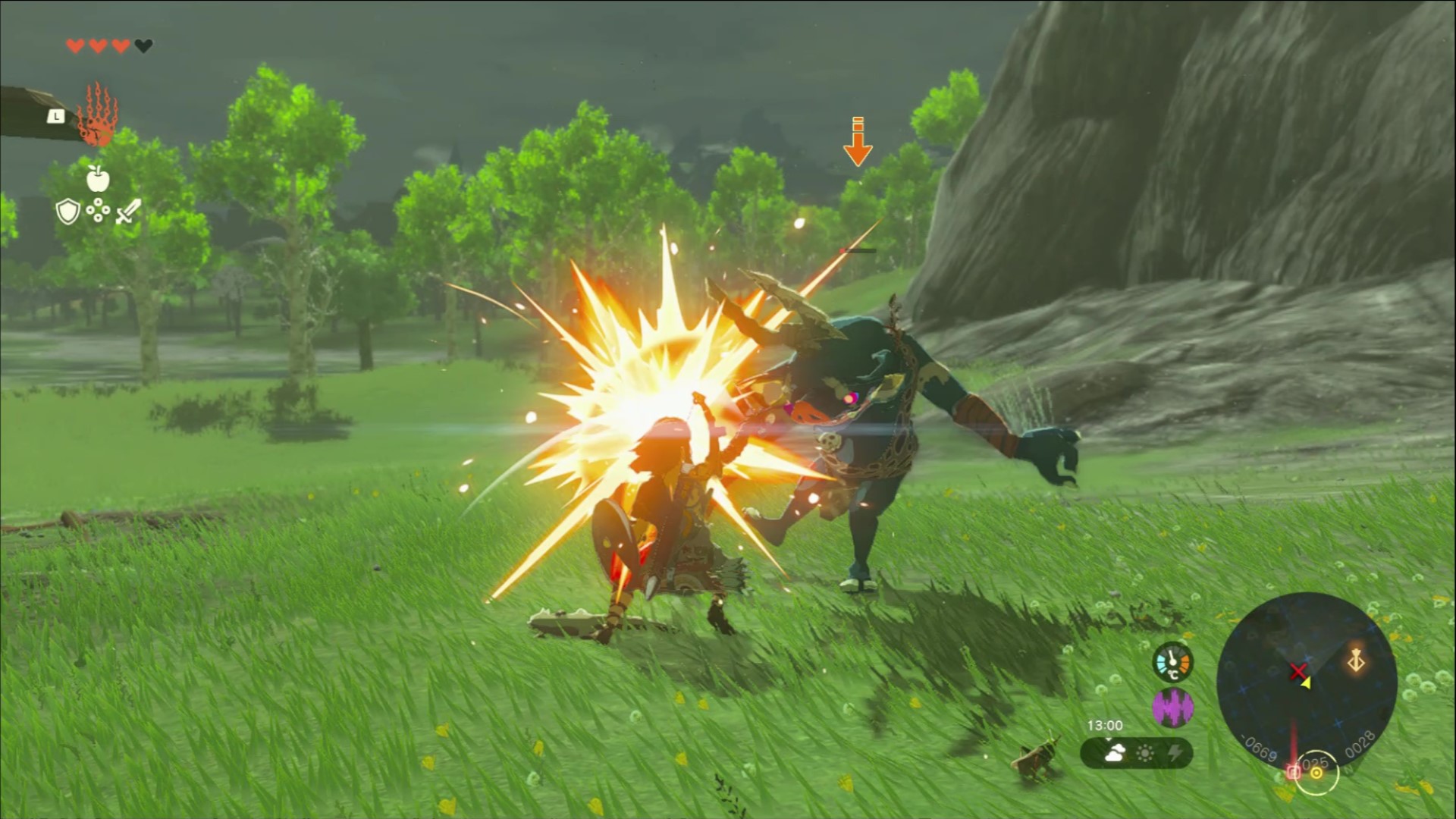
Our story begins some indeterminate amount of time after Zelda: Breath of the Wild, where Hyrule is in a period of slow rebuilding under Zelda's rule. Unfortunately, an expedition through some ruins beneath the castle results in the discovery of a familiar redhead mummy with a bad attitude, and events swiftly go wrong from there. Zelda vanishes after touching one of Hyrule's many macguffins, Link loses his right arm in the fracas, and the Master Sword is shattered into pieces. This really isn't a kingdom that can run smoothly for ten minutes, is it?
When Link regains consciousness, things have changed substantially. The castle has levitated into the air, nobody knows where Zelda is, Ganondorf has vanished altogether, and Link's mangled limb has been replaced with a new prosthetic, courtesy of some old robots that are now mysteriously showing up on the floating islands appearing above Hyrule – remnants of the Zonai civilisation that helped establish the land in the first place.
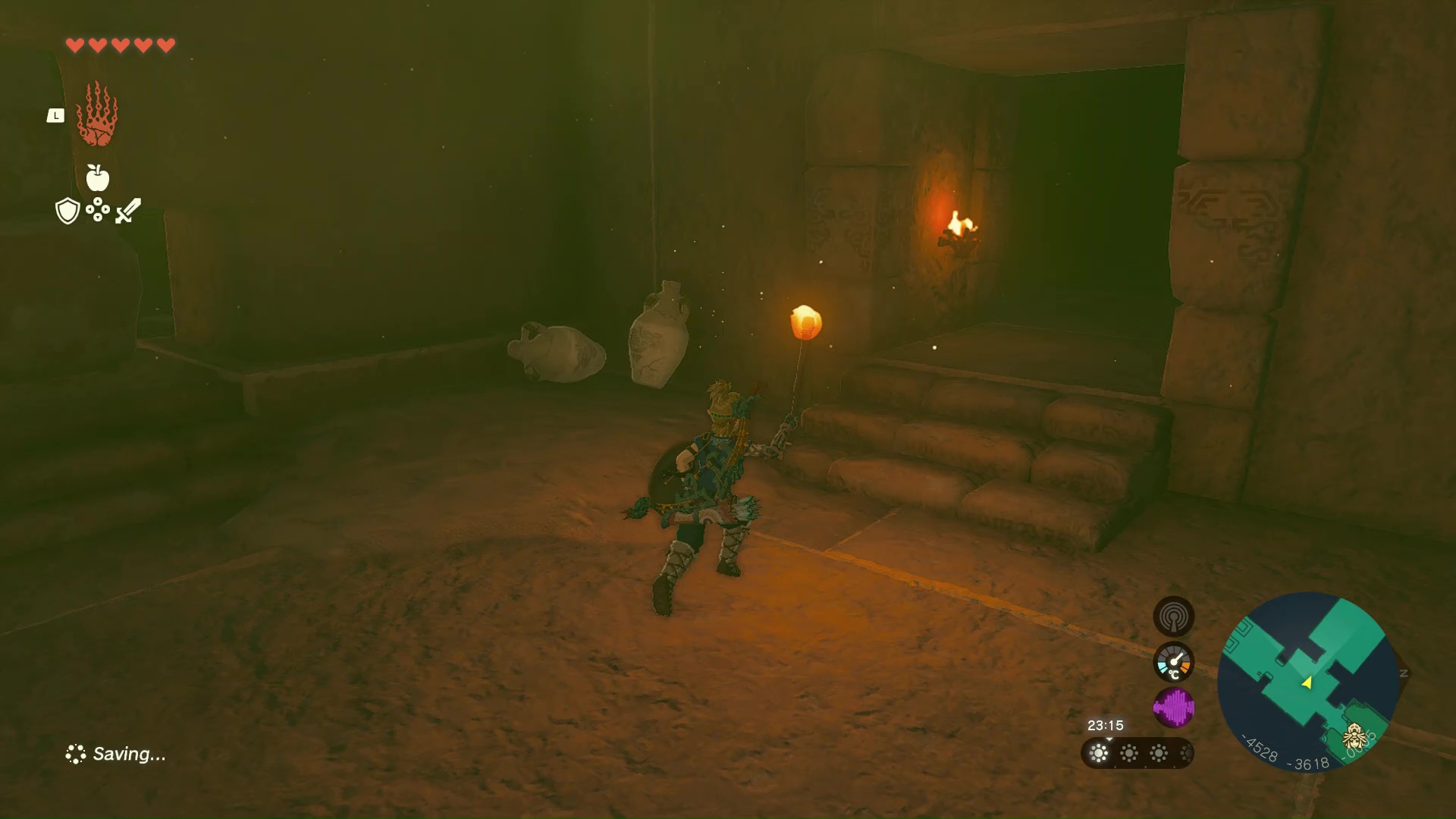
Both the plot and structure of Zelda: Tears of the Kingdom are a little more complex than Breath of the Wild. You can't head to Ganondorf or save Zelda straight away because nobody knows where either of them are, so what follows is more of a mystery narrative where you're tracing the characters' movements with the goal of finding the final confrontation. Admittedly, Nintendo's desperation to keep things kid-compatible does mean there's a lot of elements which get over-explained, with a fair few story beats that get repeated multiple times for those in the cheap seats, but I do like some of the ideas present here – without spoiling anything, the eventual reveal of Zelda's location hooked me nicely, and the whole thing has a flavour of the best Studio Ghibli movies at times, evoking stories like Princess Mononoke and Spirited Away.
That being said, I did find that the adventure was… not exactly elevated by the voice acting. I like all the actors involved and have seen them do great work in the past, but the characters' voices feel a little detached from everything around them. It can come across as though the actors didn't really know the context for what they were saying, with long pauses between each line and a stilted, forced quality that frequently took me out of otherwise impactful scenes – and with Tears of the Kingdom's delight in repeating itself, theoretically-heartfelt moments can give the awkward vibe of a university theatre production.
What's old is new again
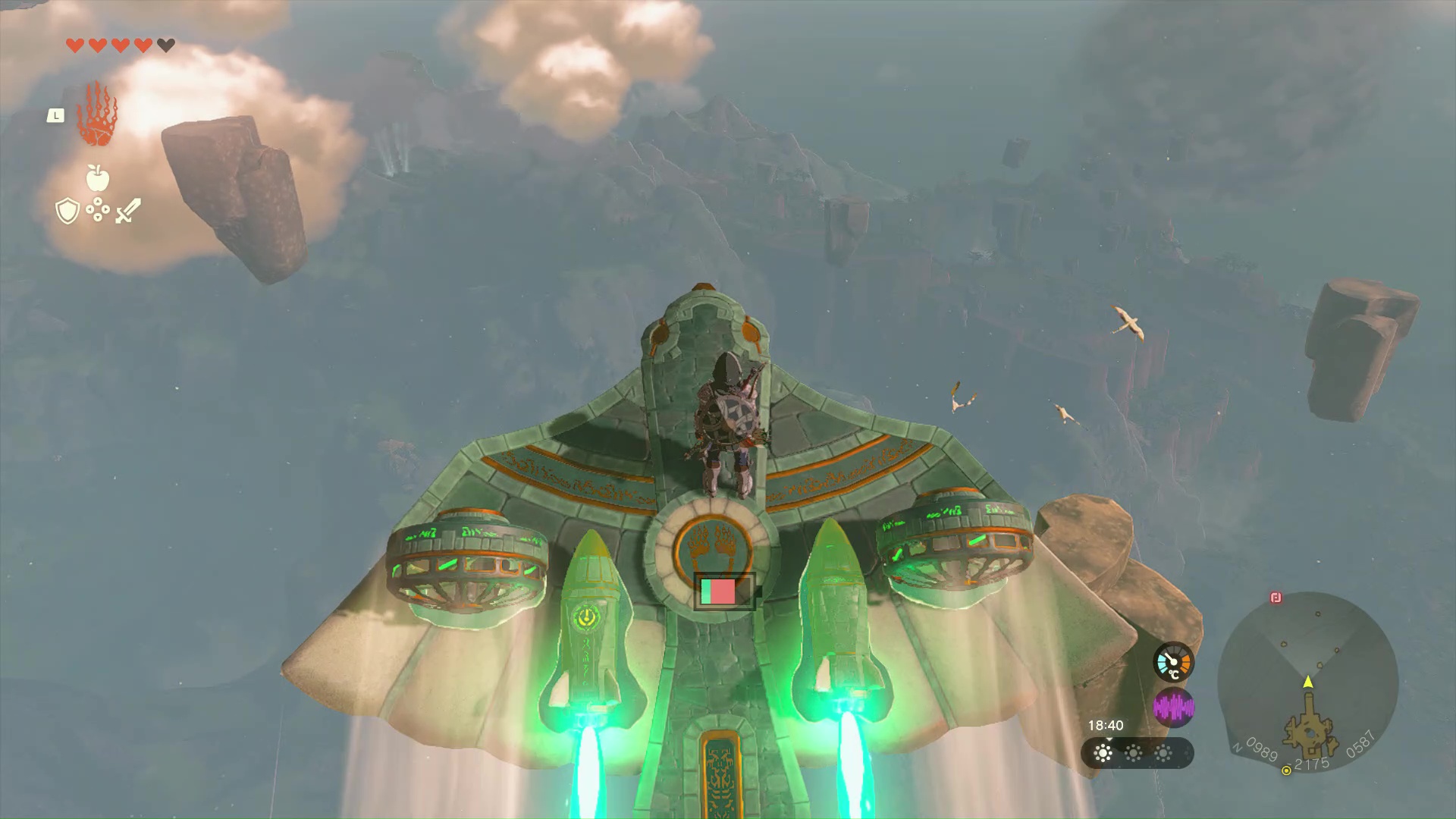
On a very fundamental level, Zelda: Tears of the Kingdom is mechanically and experientially pretty similar to Breath of the Wild. That's not a flaw – it's definitely different enough to be its own beast – but it means that a lot of your understanding of what this game is can be inferred by knowing its lineage. You explore the wider world of Hyrule, using weapons held together with classroom paste along with a selection of systems-twisting superpowers, indulging in Shrines, side quests, exploration, and more until you feel well-equipped enough to handle the main threats. With those similarities established, let's talk about how things are different.
The new powers are a good place to start, as Magnesis and the old Rune abilities are all gone. Now the main toys you have to play with are Recall, which lets you rewind objects back along their former trajectories; Ultrahand, a combo telekinesis-and-superglue for assembling devices and vehicles; Fuse, which lets you stick stuff on your gear; and Ascend, which allows you to fly up and phase through any surface close above you.
And they're all utilised in gameplay pretty damn well, with a few caveats. Ultrahand is the standout, and the one you'll use most often – sticking trees together to make a bridge or glueing some mad-science flying car out of composite pieces – but Recall was the one I found most delightful when used cleverly. After some uppity Moblins rolled a giant boulder at me, I hit it with the Recall button on my bionic arm and watched it fly back up the ramp and roll over them in a manner that was wonderfully… Wile E. Coyote.
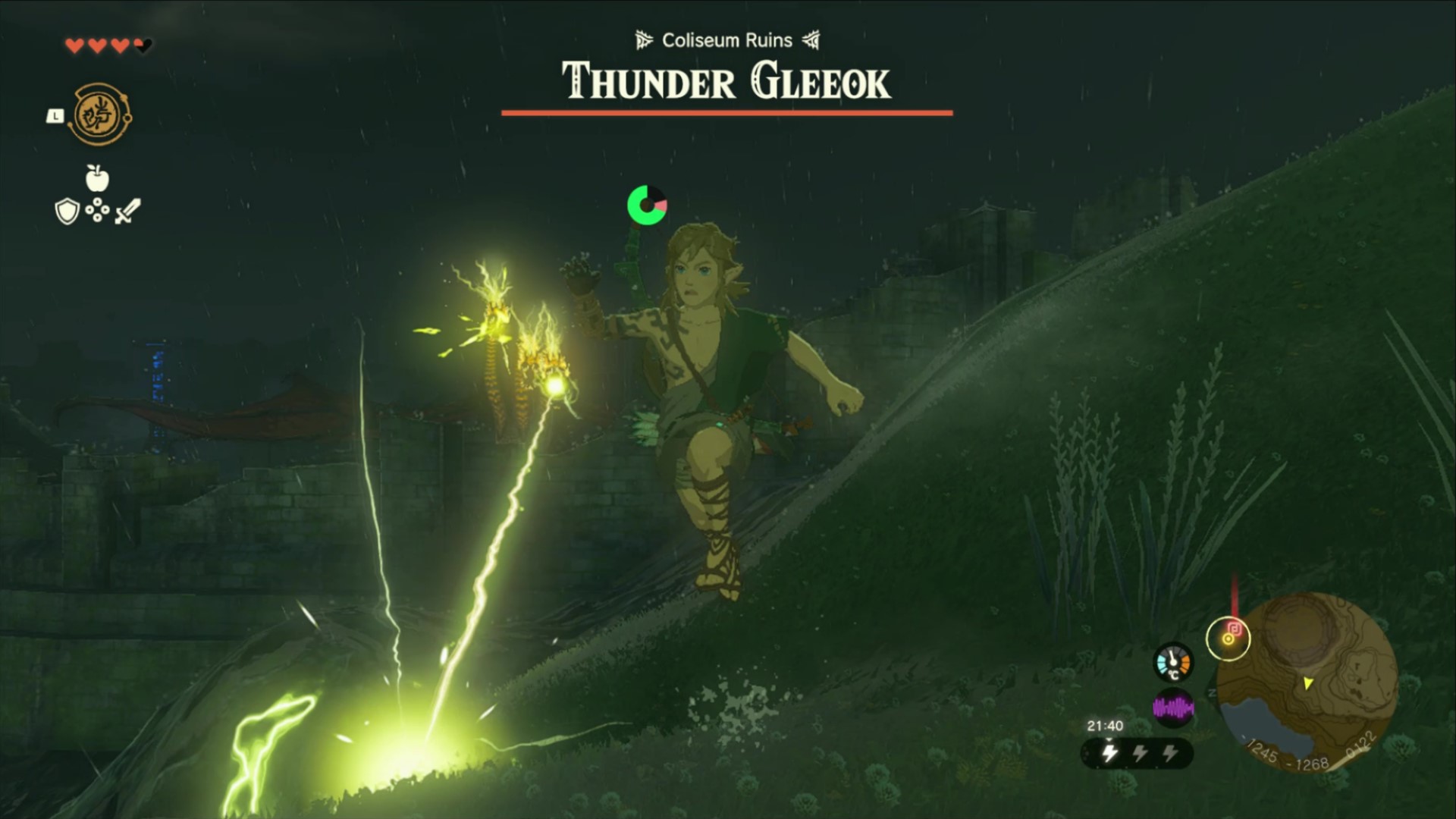
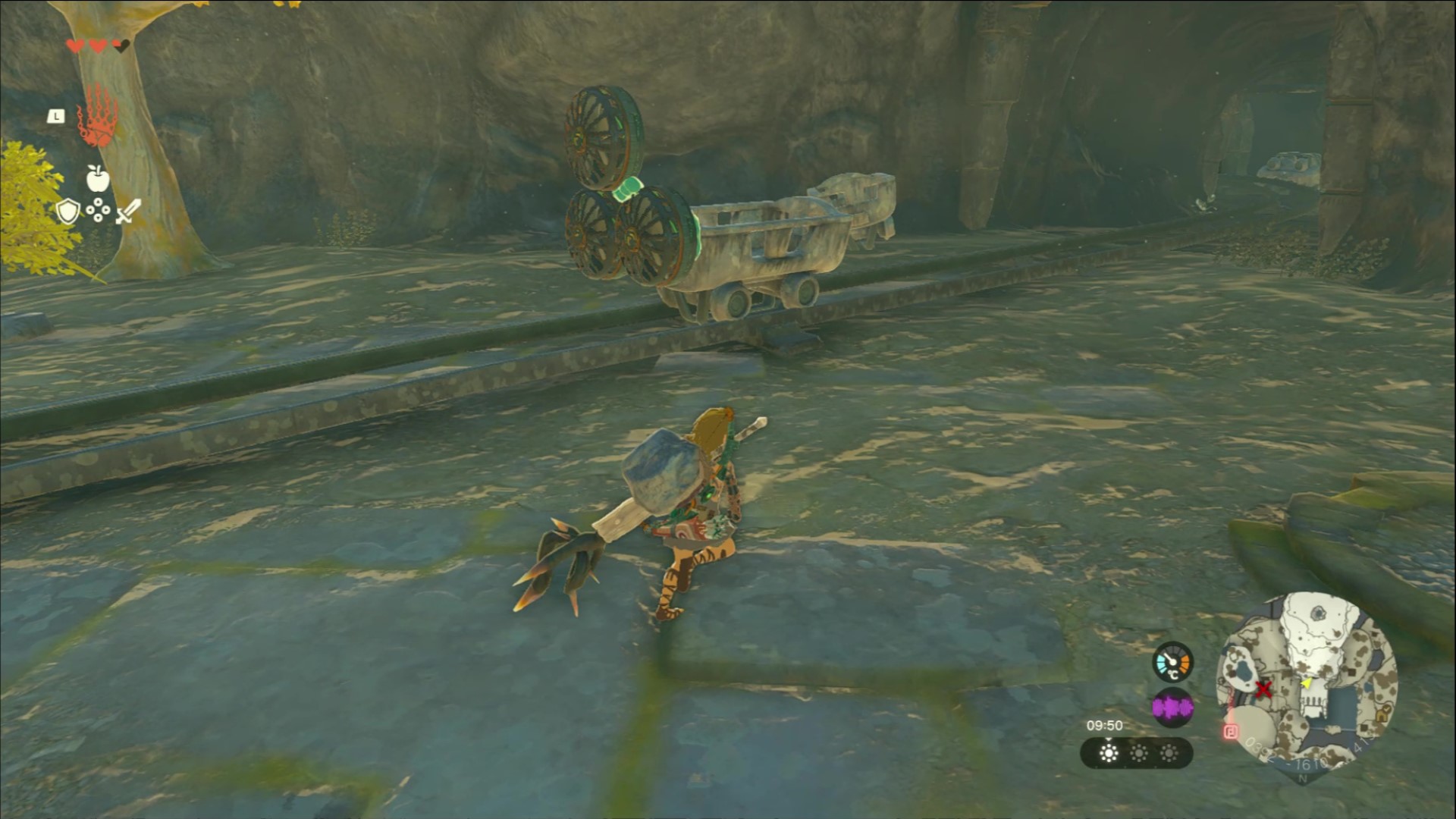
The tutorial area, "The Great Sky Islands", deserves its own special mention. Breath of the Wild absolutely nailed it with the Great Plateau, and Tears of the Kingdom hits another home run with a string of connected islands that organically teach you all the basics while never railroading you (even when you're playing with literal railroad tracks).
The issue is that while these abilities allow you to find many fun and unconventional solutions, sometimes it does feel like you're cheating the system a little. As mentioned, the rather boring process of glueing logs together will allow you to cross practically any obstacle, and I managed to skip one temple puzzle entirely when I used Ascend in the one overlooked spot that allowed me to phase up to the opposite side of a door – hardly satisfying. I get that you don't have to use certain methods, but ideally players shouldn't have to impose restrictions on themselves to have a good time or avoid accidentally missing areas of the game.
When it comes to the world itself, Hyrule from Breath of the Wild might be back, but that's just the geography – the rough layout. A lot has happened to this world in the years since, with new landmarks, altered towns, and new threats. Lurelin has been besieged by pirates and Kakariko is covered in mystic rubble; cosmic graffiti is popping up across the landscape and of course there's archipelagos of floating islands above cloud level to explore, as well as a whole subterranean realm equal to Hyrule's size under the world called The Depths. At least fifty hours after starting my adventure in Tears of the Kingdom, there's still whole regions I've barely scratched the surface of.
The floating islands are great, with some forming the best experiences in the game, and I just wish there were more of them to explore. They're somewhat sporadic and rarely mandatory, so you don't find yourself up there all too often. Contrarily, I found myself kinda dreading The Depths, which are dark, confusing to navigate, monotonous, and which the game keeps forcing you to visit, which I always did on sufferance and with grim efficiency. It's not awful per se, but it's definitely the moment where Tears of the Kingdom asks you to eat your vegetables.
Make it 'til you break it
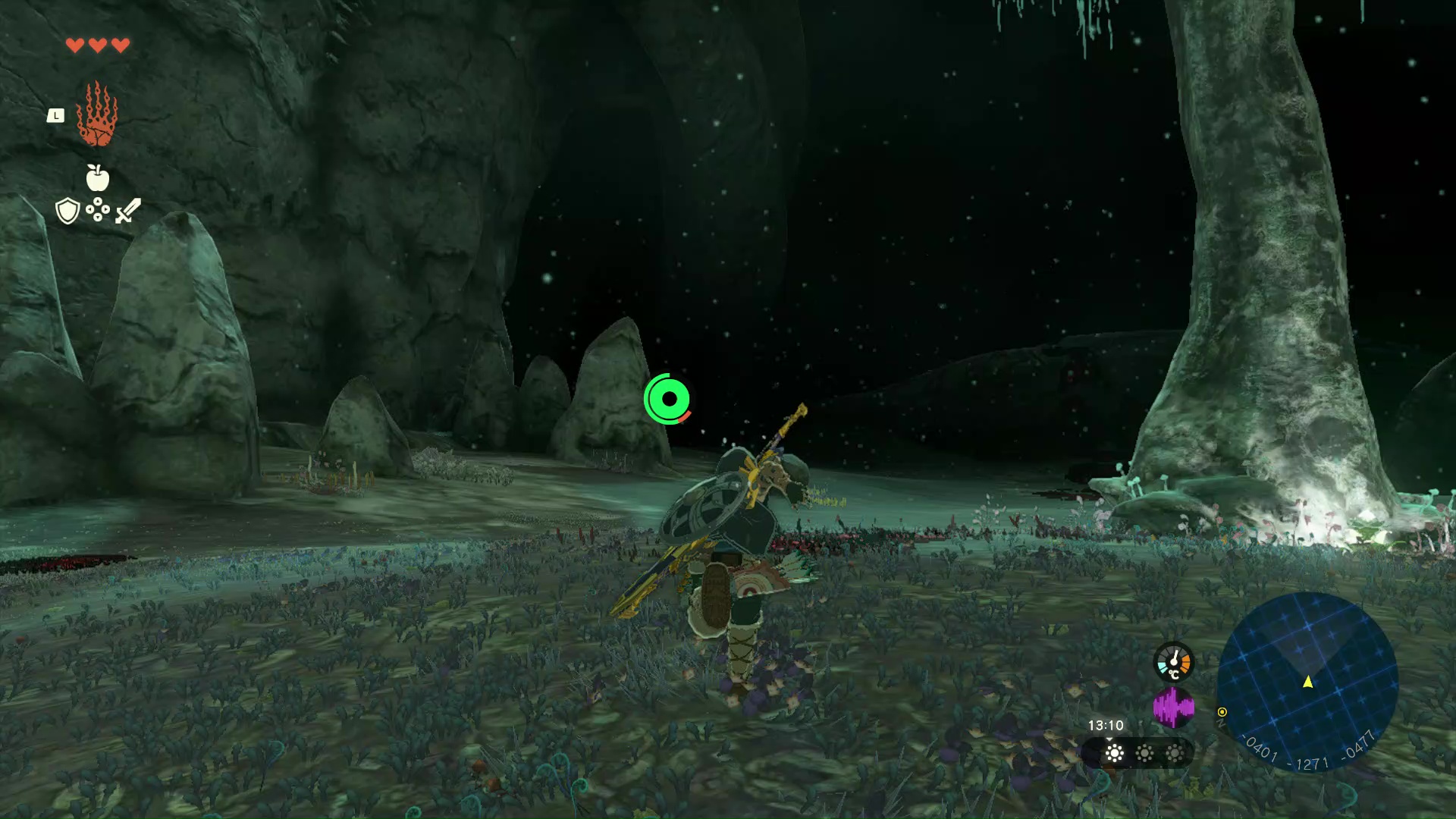
Let's narrow the focus a little. Weapon durability is back, and not only that, it's more prevalent than ever before. While this element was contentious in Breath of the Wild, forcing you to constantly swap out your arsenal of accrued weapons to survive, the system has been given a new lease on life in Zelda: Tears of the Kingdom. There's one NPC early on who basically stares you in the eye and tells you that weapons are even more fragile than last time, as if daring you to complain, but the solution is literally in your hand. Fusing your weapons ups their durability depending on what you mix them with, so you're always motivated to keep customising them if only to delay the moment they shatter on a Gleeok's nose.
Speaking of stuff breaking, Tears of the Kingdom's technical performance was generally adequate, a solid B-grade with the usual provisos and asterisks that come with Switch software at this late stage of the generation cycle. It occasionally stuttered when too many NPCs gathered round or constructed vehicles got too complex for the game to easily handle – they're effectively a series of disparate systems rubbing against each other, after all – and transitioning between different areas often generated a hiccup of lag or choppy animation. But after a string of recent high-profile technical failures for the Switch, I'm happy to report that Tears of the Kingdom handles itself well enough by comparison, and without much loss in handheld mode.
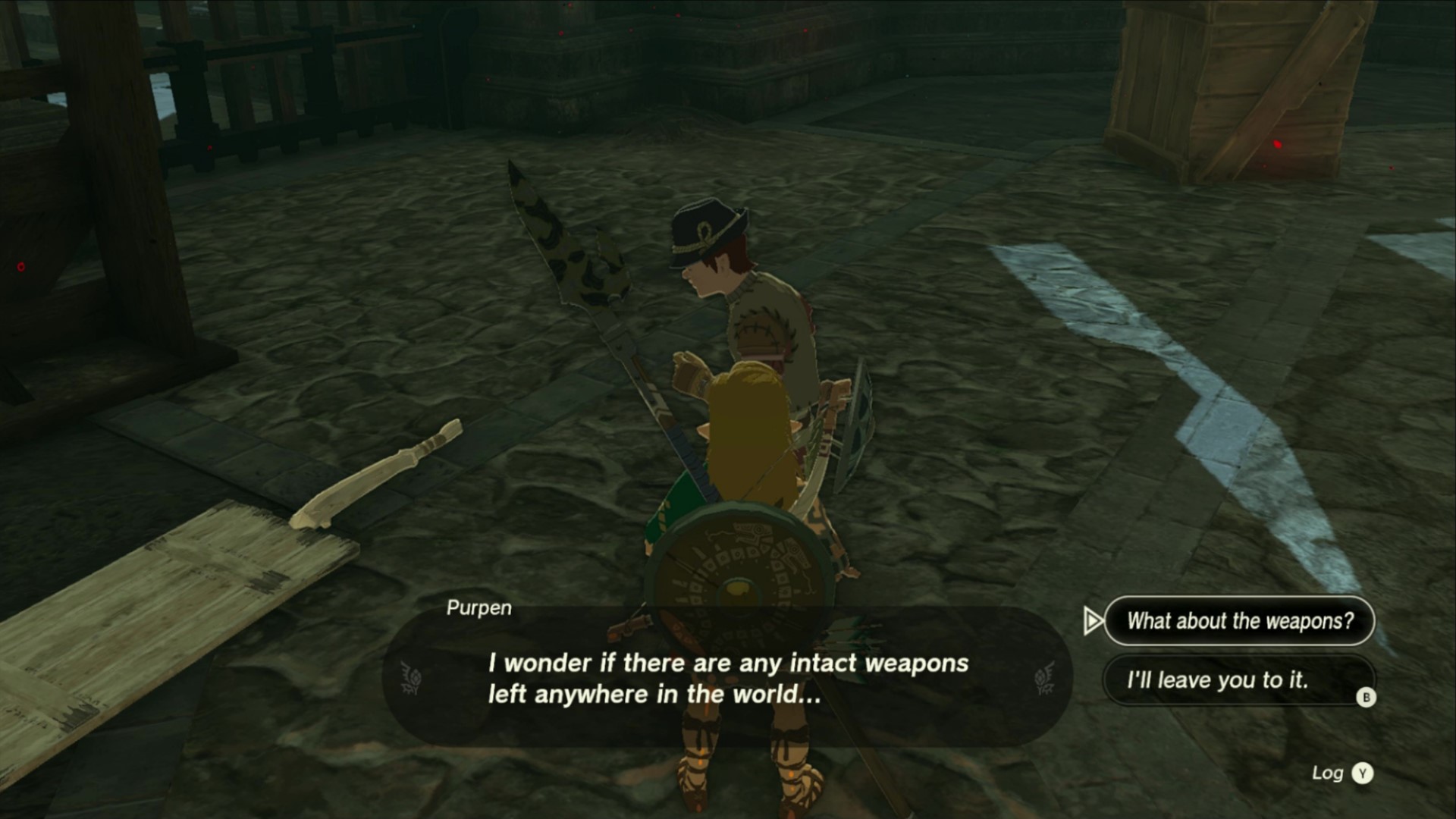
"Tears of the Kingdom sets a standard for immersive gameplay that most major games don't even try to achieve, let alone match"
Those aforementioned vehicles were a definite high point, but one I wish Tears of the Kingdom pushed a little harder. Some of the best moments are when you fight a hydra on a biplane or create clattering death machines that rumble over the landscape, but it's rarely a thing you actually need to do, and the effort to build them rarely matches their output. With many of them being dependent on a limited, slow-recharging battery, they usually roll on for about forty feet before wheezing to a sudden stop and needing a rest, especially early on.
That biplane-battling hydra was one of the best bosses, by the way, though the boss roster itself is a mixed bag. There's a flying centipede above mountains that I found completely thrilling to tussle with, but later you'll go against a mech suit in a boxing arena, and it's one of the most agonising gaming experiences I've had in a while. Perhaps it would have been better if the UI wasn't somewhat unintuitive and pace-breakingly slow to use – Breath of Wild had the same problem, and while it's technically better in Tears of the Kingdom, it's still not good. Let's be honest, it's cumbersome having to regularly pause an exciting fight to eat a mushroom or pick out a single-use item to use.
Hey, LISTEN!
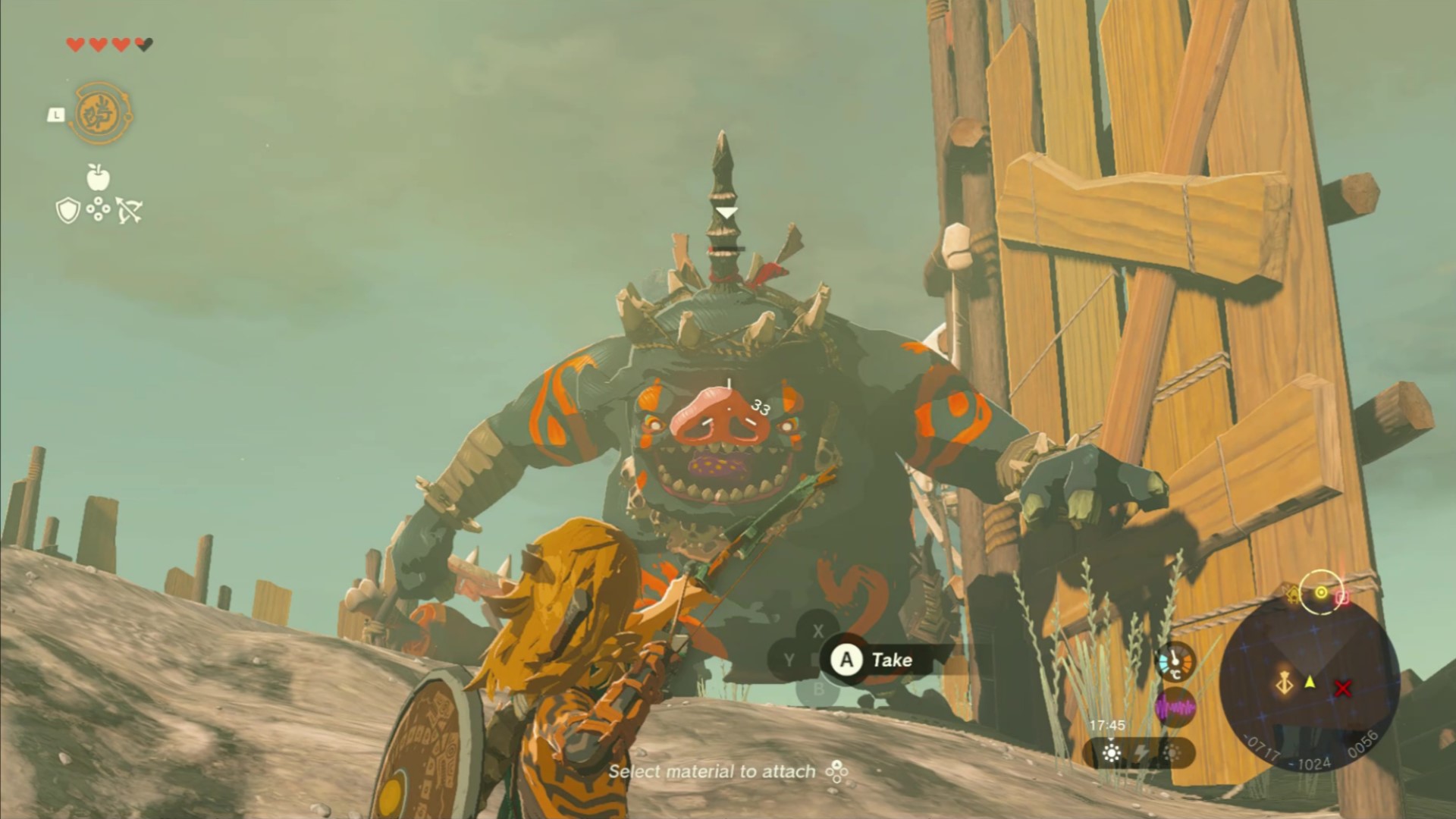
I have my criticisms of Zelda: Tears of the Kingdom and I'll hold firm that they're valid. I'll also fully admit that they pale in comparison to the game's strengths: the world and the systems you use to draw gameplay from it. It's the latter that's the real standout, the thing for which Tears of the Kingdom will be justly praised and remembered. This is a game that wants you not just to play with its enemies, animals, weapons, and vehicles but with the mechanics of the game – mixing gameplay formulas like a kid smashing Lego together.
You make the vehicles you want, fight with the weapons you choose, and explore whatever section of the world appeals to you. Sometimes your tinkering is a success, and sometimes you fail spectacularly, but it never stops being fun. Tears of the Kingdom sets a standard for immersive gameplay that most major games don't even try to achieve, let alone match. So yes, though almost intimidatingly big at times, Tears of the Kingdom manages to keep focus and provide a rich, robust experience that builds on what came before. I've basically done nothing but play the game for two weeks, and even now I have no intention of stopping any time soon. What better recommendation could a person give?
The Legend of Zelda: Tears of the Kingdom was reviewed on Nintendo Switch OLED with a code provided by the publisher.
More info
| Genre | Adventure |

Joel Franey is a writer, journalist, podcaster and raconteur with a Masters from Sussex University, none of which has actually equipped him for anything in real life. As a result he chooses to spend most of his time playing video games, reading old books and ingesting chemically-risky levels of caffeine. He is a firm believer that the vast majority of games would be improved by adding a grappling hook, and if they already have one, they should probably add another just to be safe. You can find old work of his at USgamer, Gfinity, Eurogamer and more besides.
